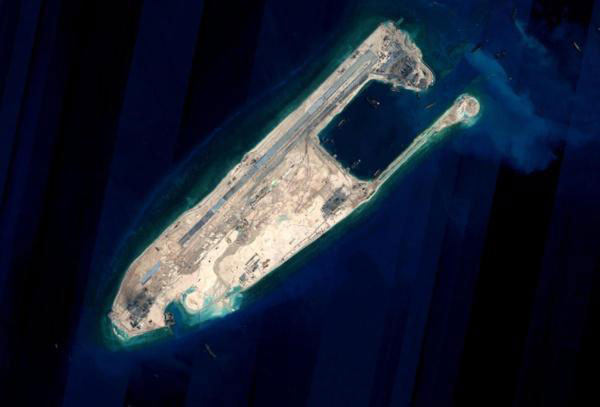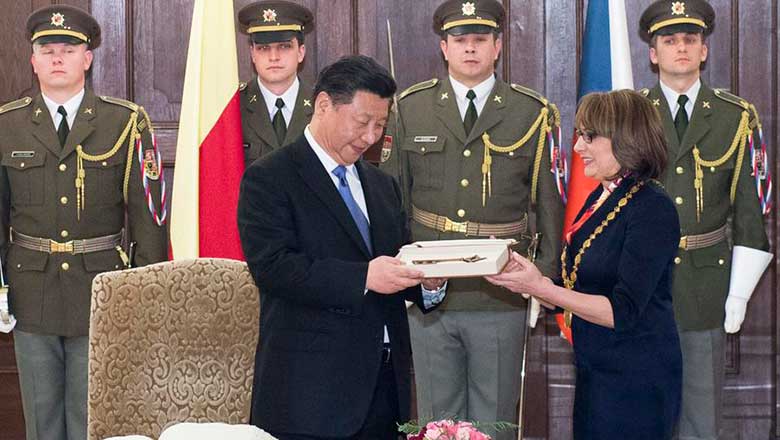Prudence can help solve South China Sea issue
Updated: 2016-03-31 13:34
By Jin Yongming(China Daily)
|
||||||||
 |
|
This satellite image shows the Yongshu Jiao of China's Nansha Islands. [Photo/Xinhua] |
China's refusal to accept the arbitration initiated by the Philippines in the South China Sea issue in 2013 is entirely in accordance with the law. In 2006, China exercised its right under Article 298 of the United Nations Convention on the Law of the Sea to reject compulsory arbitration on the issue.
Although the ruling by the Permanent Court of Arbitration on Manila's complaint will be announced later this year, a part of it has been released. And the available content of The Hague-based court's ruling has several flaws.
For one, it falsely judges the ownership of a low-tide elevation according to the UNCLOS' definition, which refers to "a naturally formed area of land which is surrounded by and above water at low tide but submerged at high tide". In contrast, it is international law that decides whether a low-tide elevation can be owned by a relevant coastal country, particularly when it comes to territorial acquisition. Many countries, including China and the Philippines, are yet to reach a consensus on the tidal datum, which plays a vital role in judging the ownership of low-tide elevations in the light of international law, leading to disparities over delimitations in the South China Sea.
Therefore, it would be inappropriate and unconvincing for the Hague-based court to make an arbitration tribunal decision before making clear the limitations of the UNCLOS in disputes over low-tide elevations.
It should also be noted that the United States has intensified its security-related intervention in the South China Sea issue, although it doesn't even remotely concern its national security, to push forward its "pivot to Asia" strategy. To strengthen its leadership in the region and fulfill its "defense-oriented" obligations to help allies like Manila, Washington has sought to challenge Beijing's legal construction work on its own islets and reefs.
The US' provocative actions over the past months, including the recent intrusions by the its guided-missile destroyers USS Lassen and USS Curtis Wilbur into the waters near China's islands in the South China Sea, have resulted in serious frictions between the two countries over regional maritime issues. The US is also likely to hold more joint military drills with some of its Asian allies and further bolster its military bases in the region, in the hope of consolidating its foothold in the South China Sea.
In response to Washington's increasing provocations, particularly its warships' "free navigation" in the waters off China's Xisha Islands, Beijing has exercised the utmost restraint to avoid an open conflict.
On the one hand, Beijing has to take a prudent stance on the South China Sea issue, because the baselines of some Nansha islets and reefs remain unclear even though UNCLOS allows reclamation work on its islets and reefs. On the other hand, coastal nations reserve the right to ask foreign ships availing of "innocent passage" to abide by relevant laws and regulations. Therefore, China and the US should hold more talks, in a bid to reach a consensus on "freedom of navigation" and major security issues. Should they succeed in their endeavor, other coastal countries can use some of the resultant rules to deal with similar disputes.
To better safeguard regional peace and stability, China also needs to work with the Association of Southeast Asian Nations to facilitate consultations over the Code of Conduct in the South China Sea. Besides, it should make more efforts to implement the 21st Century Maritime Silk Road Initiative to deepen China-ASEAN cooperation as a counter-measure to the joint efforts of the US and the Philippines to muddle the South China Sea waters.
The author is director of the Ocean Strategy Studies Center at the Shanghai Academy of Social Sciences.
- Cypriot court remands in custody man suspected of hijacking EgyptAir flight
- Govt eyes luxury tourists amid concerns over safety
- Sleep tight and don't let sharks bite at Paris aquarium
- Aung San Suu Kyi appointed as Myanmar's new foreign minister
- Hollande promises to tighten Euro 2016 security
- US officials applaud China for nuclear cooperation

 President Xi presented with 'key to Prague'
President Xi presented with 'key to Prague'
 China move into the final stage of Asia qualifiers after 15 years
China move into the final stage of Asia qualifiers after 15 years
 Grief, anger engulf Taiwan as suspected killer of girl arrested
Grief, anger engulf Taiwan as suspected killer of girl arrested
 Stolen Buddha statue head arrives in Hebei museum
Stolen Buddha statue head arrives in Hebei museum
 Top 10 best-selling beers in the world
Top 10 best-selling beers in the world
 Czech President Milos Zeman hosts Xi at private residence
Czech President Milos Zeman hosts Xi at private residence
 The snow-white world of a tombstone carver
The snow-white world of a tombstone carver
 Conjoined twins' operation bittersweet for family
Conjoined twins' operation bittersweet for family
Most Viewed
Editor's Picks

|

|

|

|

|

|
Today's Top News
Marriott unlikely to top Anbang offer for Starwood: Observers
Chinese biopharma debuts on Nasdaq
What ends Jeb Bush's White House hopes
Investigation for Nicolas's campaign
Will US-ASEAN meeting be good for region?
Accentuate the positive in Sino-US relations
Dangerous games on peninsula will have no winner
National Art Museum showing 400 puppets in new exhibition
US Weekly

|

|








